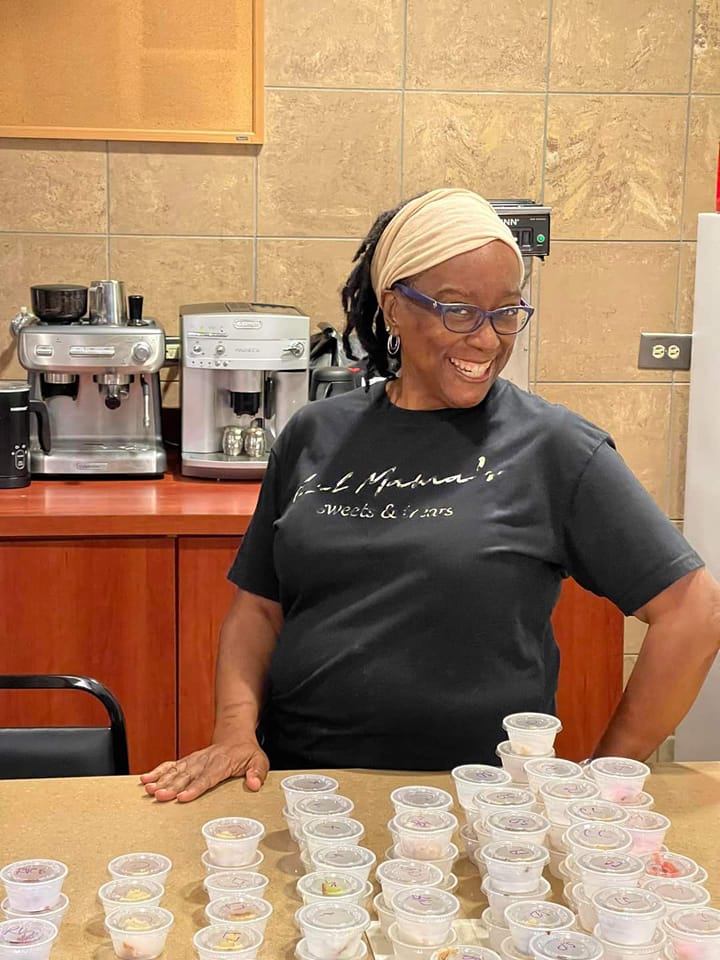
Katrina Golden of Lil Mama Sweets and Treats shares candid insights on keeping a small business afloat when ingredients soar and orders decline
In third installment of our series of articles examining the impact of the current administration’s economic policies on small businesses and diverse businesses, Katrina Golden, owner of Lil Mama’s Sweets and Treats discusses how to stay profitable when the rules keep changing.
Six years ago, Katrina Golden turned her childhood passion into a thriving business. What started with a burned cake in an Easy-Bake Oven has evolved into Lil Mama Sweets and Treats, an award-winning bakery located in Augusta, Georgia and recognized as “Best of Georgia 2024” in the desserts category.
“We bake everything from scratch,” Golden proudly states. “We tell everybody we bake like your mom and [family] used to or should have if they didn’t.”
Golden’s journey from family recipes to entrepreneurship represents the authentic American dream that countless small business owners pursue. However, that dream is currently facing significant headwinds due to economic pressures and policy decisions that are affecting businesses across the country.
Economic Realities Hitting Home
A recent survey by Small Businesses for America’s Future revealed that 63 percent of small business owners feel the economy is on the wrong track. Golden confirms this sentiment reflects her own experience.

“For example, this is golf week or Master’s week in Augusta. And by now we would have seen a serious uptick in the amount of orders,” Golden explains. “This time last year, I had five orders on the books by the end of March. This time I didn’t have any.”
These weren’t small orders either. Golden typically receives substantial catering requests during this period, with businesses ordering 10 to 11 cakes at once. The complete absence of these orders marks the first time in her business history that this revenue stream has dried up.
“I’m noticing that our sales for first quarter were notoriously slow for food service anyway, but they were slower than normal,” she adds.
The Ripple Effect of Tariff Policies
When asked specifically about how current tariffs and trade policies are affecting her business, Golden shared concerning insights about disruptions to her supply chain.
“I’ve been [contacted] by one of our suppliers, which happens to come from overseas,” she recounts. Before the tariffs were officially implemented, her supplier encouraged her to place orders early, warning that delays might occur later.
“She says, ‘Do you want to put your order in now? Because if you wait, it may be a while before we can get it out to you,'” Golden recalls. “I’m like, ‘Yeah, I do. But I don’t want to spend that kind of money right now.’ But in light of recent news, I really wish I had because now the price has gone up.”
The products affected include essential business supplies: cups for their coffee shop and packaging materials for their baked goods. Many of these supplies come from overseas vendors who are directly impacted by the tariff policies.
Rising Costs Squeeze Margins
It’s not just imported supplies that are causing financial strain. The basic ingredients that form the foundation of Golden’s business have seen dramatic price increases.
“At the beginning of the year I raised my prices a little bit simply because the price of eggs was crazy,” she explains. “And not just eggs but butter, flour, sugar—all of that went up and that’s the staple of my business.”
While Golden has absorbed some of these costs to avoid dramatic price increases for customers, the continuing economic pressure may soon force her hand.
“We haven’t [raised prices] yet. But if this continues, we will absolutely have to,” she admits.
Adapting to Survive
Rather than immediately passing costs to customers, Golden has implemented creative solutions to maintain affordability while preserving her profit margins.
“We sell cakes by the slice so our portion sizes are smaller in order to keep my prices even fairly similar,” she reveals. “That’s the only way we can really make it. They’re not much smaller, but they’re smaller.”
This delicate balancing act—maintaining quality while adjusting quantity—represents the kind of behind-the-scenes decisions small business owners across America are making daily.
“It’s either that or I raise my prices,” Golden explains. “And my customers are such that we can have that conversation. If they ask me, I’ll tell them, ‘Hey, I’m sorry, but I’m not going to give you the exact same slice you got four months ago. Simply because we have to make a profit and it’s either that or else we can’t stay in business. We’re not a nonprofit here.'”
The Human Element: Why Small Businesses Persevere
Despite the economic challenges, Golden remains committed to her business. When asked what keeps her motivated to continue, her answer is immediate and heartfelt.
“My customers. Bottom line, my customers are the absolute best,” she says with conviction. “There’s never a dull moment. And just seeing somebody come by, whether it be on our mobile coffee and dessert bar or at the coffee shop at the VA hospital saying, ‘I had your [product] and it was so good. I had to tell everybody about it. I called my mama and told her, this cake tastes almost like what you made for me eons ago.'”
This connection with customers provides the emotional fuel that keeps many small business owners going through difficult economic times. For Golden, the thought of disappointing these loyal supporters is unthinkable.
“We don’t want to have to ever go out of business because I don’t want to have to disappoint my customers like that,” she says.
A Call for Policy Stability
When asked what she would like to see from policymakers, Golden doesn’t hesitate to advocate for more direct communication between legislators and the small business community.
“I would love to see policymakers prioritize hearing from us first, before any potential legislation goes into effect,” she urges. “Talk to a few small business owners, especially those that are in their districts and see how we feel about it.”
Golden believes this disconnect between policy decisions and on-the-ground business realities creates unnecessary hardship.
“Oftentimes, lawmakers will say something or do something and then when they hear about it from us, they’re like, “Well, maybe we shouldn’t have done that.” Well, yeah, maybe you should have talked to us first and we could have told you.”
Her suggestion is practical and straightforward: “It doesn’t have to be a town hall meeting, but just a roundtable. Call in about five or six small business owners in your district and say, ‘This is what we want to do. This is what’s being put on the table. Tell us how you feel about it. How will this affect you?'”
Navigating an Uncertain Future
Looking ahead to the next 12 to 18 months, Golden describes her outlook as “somewhere in between” hopeful and cautious.
“We’re always hopeful because you don’t go into business thinking that you’re going to fail. That’s not the reason why you open up the doors,” she reflects. “But with this whiplash effect of ‘we have a tariff, we don’t have a tariff. We have this policy, we don’t have this policy.’ We don’t know from almost from hour to hour what we should do.”
This uncertainty creates a paralysis that affects business planning and growth. Golden specifically mentions how it impacts her hiring decisions.
“I would love to hire somebody so that I don’t have to [fill in for employees who call out], but I can’t do that right now. Not that we necessarily can’t afford to. I don’t want to put that cost out and then have to lay somebody off.”
She emphasizes that this unpredictability has broader implications: “We employ a lot of people, especially where we live in a military town. But we have a lot of college students too. So, we employ a lot of college students and that helps them and helps other people that maybe need another fresh start or just a second part-time job or something like that.”
Community Support in Challenging Times
Despite the economic pressures, Golden continues to find ways to give back to her community. At their VA hospital location, they’ve created a “gifts wall” allowing customers to pay it forward.
“I started that because I wanted to be able to give back. My husband and I are both veterans,” she explains. “We did that knowing that not everybody can afford a $7 latte, but they may want one. Or just in that moment they may need one.”
This initiative reflects how small businesses often serve as social anchors in their communities, providing more than just products and services.
“So, the fact that we give back and people come to us, and they say, ‘I just need…’ I’m like, ‘We got you. Put your wallet away, we got you,'” Golden says. “Maybe if I could put a smile on somebody’s face, that’s our thing, our motto, ‘Bringing Joy with the First Bite.’ So if we could put a smile on somebody’s face, even if just for a moment, that makes a difference to us.”
Words of Wisdom for Fellow Entrepreneurs
When asked what advice she would give to other small business owners facing similar challenges, Golden’s message is simple but powerful:
“Just stay the course, hang in there. We’re all in this. Just hang in there, really, just hang in there. We know it’s probably going to get a little worse before it gets better, but it’s got to get better.”
Her final message to policymakers: “Our small businesses need stability to make sound business decisions… We just need some stability. Can somebody make up their mind and let us know what it’s going to be that way? We can plan accordingly.”
Golden emphasizes that the economic impacts go beyond individual businesses: “This back and forth, back and forth is not helping us or the economy at all… Stability is a big thing. And, if we don’t have it, our economy, our prosperity is not going to go anywhere.”
As small business owners like Katrina Golden continue to navigate these challenging economic waters, their resilience, creativity, and community focus remain essential ingredients in the recipe for survival. While current tariffs and economic policies present significant obstacles, the determination of these entrepreneurs to adapt and persevere offers hope that they will continue finding ways to sweeten life’s moments—even during the most uncertain times.













